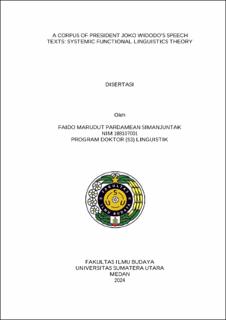| dc.description.abstract | This study investigates the types of Processes, Participants, and Circumstances in the presidential speeches of President JokoWidodo, the appraisal system in terms of attitude, and the patterns of representation of Joko Widodo’s corpus of presidential speech. The research method used is a descriptive qualitative study. The data of the research are transcriptions of President JokoWidodo’s speech text in 2015 and in 2018. In order to be processed with a corpus analysis tool, the data is stored in a text file or .txt format with UTF-8 encoding. The instrument which is used in this study is the UAM Corpus Tools 3.2, developed by Donnel (2008). AntConc is also used to bring up words that often appear and keyword in the corpus and analyzes text patterns with certain letter arrangements. In the appraisal framework, the data were also collected from the transcriptions of President Joko Widodo’s speech text in 2015 and in 2018. The data were coded based on the domains of attitude in the appraisal framework, namely affect, judgment, and appreciation. Results showed that material process types are found more than the other process types, both in 2015 and in 2018. This indicatesthat, by using material clauses, President Joko Widodo strongly desires to emphasize real work or action work in his speech, like to produce something which is related to physical development or national development or which is related to human resources development. In terms of participant, the participants that appeared the most were Actor and Goal, both in 2015 and in 2018. It means, President Joko Widodo, in his speech always said the word ‘we’ or ‘others’, in this case Indonesian citizens, must work together to achieve our goals. In terms of Circumstance, in the text of Joko Widodo’s presidential speech in 2015, the most dominant are Location (32 occurrences), Cause (29 occurrences), and Manner (25 occurrences) while in the text of Joko Widodo’s presidential speech in 2018, the most dominant are Cause (60 occurrences), Manner (55 occurrences), and Location (50 occurrences). Location is again one of the most dominant circumstance features in the text. This indicates that President Joko Widodo is consistent in approaching his people to meet them directly. In terms of Appraisal system, results showed that the three kinds of attitude (affect, judgment, and appreciation) are applied in the texts, but most common are propriety (+) and valuation (+). In addition, there is a typical kind of change of affect in the text, not only that inclination that occurred in 2018 was the same as in 2015, but it occurred in all affect categories. Regarding pattern in the text, several appear from words contained in the corpus. Among them are the existence of words that have prefixes, suffixes, prefixes and suffixes, and repetition. Further, from the frequency and keyword analysis, it can be seen that Joko Widodo is focusing his attention on achieving the goals for the Indonesian nation and state, both in the 2015 and 2018 speech texts. It can be concluded, if viewed from the positive side, this can be considered as a consistency. On the other hand, if viewed from the negative side, this may not be considered as providing a new breakthrough because it uses the same patterns as the speech from three years earlier. | en_US |


